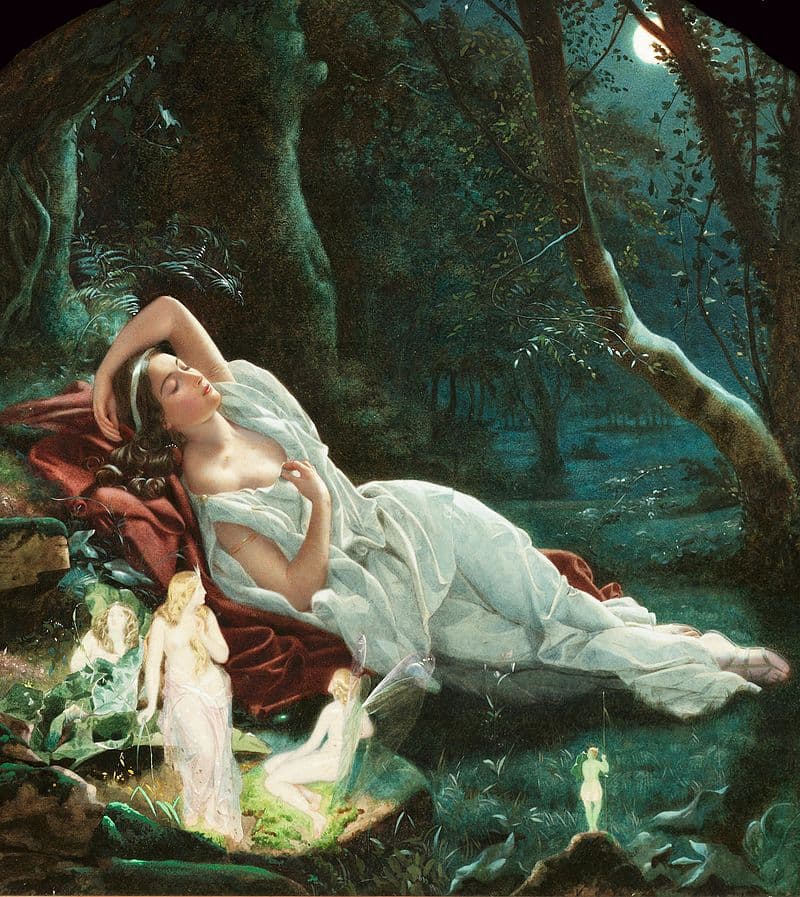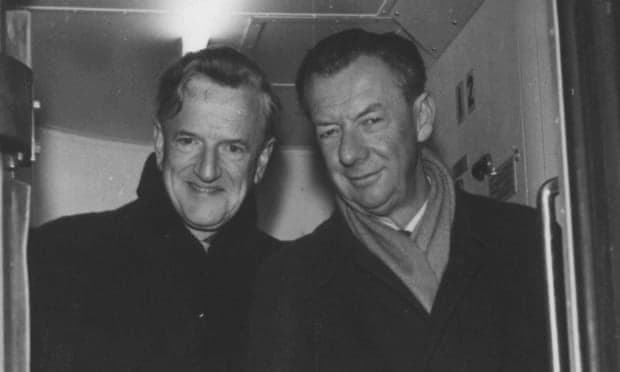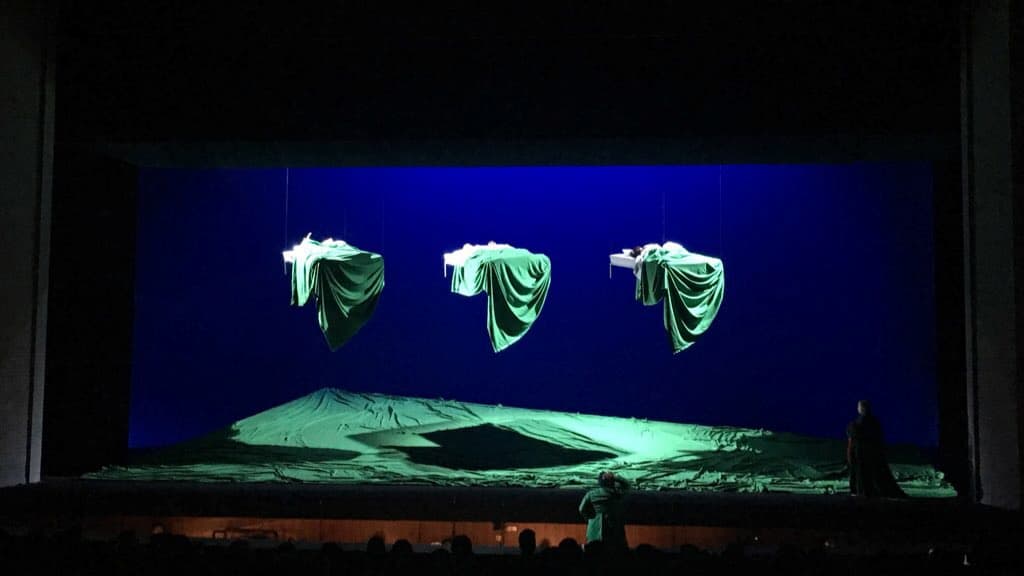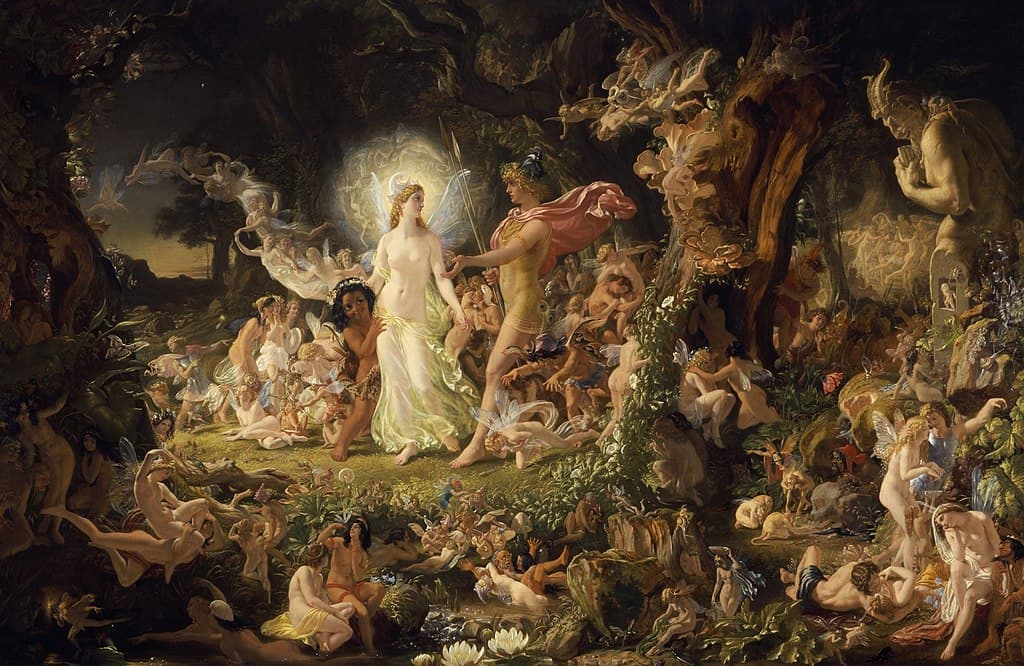When a marital disagreement between the king and queen of fairies spills into the human realm, it creates a tangle of misdirected spells and misplaced love affairs. With the fairies spreading accidental chaos far and wide, nothing is what it seems in Shakespeare’s magical collision of worlds in his Midsummer Night’s Dream. Fairies, bumbling rustics, and moonstruck lovers never really understand what hit them as flowers come alive, trees whisper, and calamitous love potions cause riotous consequences.

John Simmons: Titania sleeping in the moonlight protected by her fairies
Premiered on 11 June 1960 at the Aldeburgh Festival, Benjamin Britten took Shakespeare’s edgy fantasy, and completely faithful to the spirit of the original, composed one of the most successful and spellbinding operatic adaptations of the play. Britten wrote, “I have always loved MSND, and was excited by the various levels of action between the different groups of characters.” Shakespeare’s play offered the composer two distinctly different worlds, one human, and one inhabited by fairies. The real and unreal worlds all mixed together until reality becomes fantasy.
Benjamin Britten: Midsummer Night’s Dream, (Trailer)
Shakespeare’s play also offered that ambiguous eroticism that pervades much of Britten’s musical language. The play contains all the dramatic elements, moments of genuine human emotion, a bewitching air of wonder, and lots of romance, that have made MSND an audience favorite for centuries. And the same qualities are equally abundant in Britten’s operatic adaptation.

Britten and Pears, 1960s
However, Britten and Pear made several radical changes to the Shakespearean play. For one, the opening of the opera is now set in the forest near Athens, and it gradually introduces supernatural beings before the human lovers, the rustics, and the Duke’s court. They also reduced Shakespeare’s five acts to three by cutting roughly half the text. Despite these enormous cuts to the text, Britten famously stated, “the original Shakespeare will survive.” By operatic standards, that still leaves an enormous number of characters. Yet, Britten’s music brilliantly moves between these distinctly different worlds, illuminating their relationships with, and to each other.
Benjamin Britten: Midsummer Night’s Dream – Act I: Is all our company here? (Roger Bryson, bass; Donald Maxwell, baritone; Adrian Thompson, tenor; Robert Horn, tenor; Richard Suart, bass; Andrew Gallacher, tenor; City of London Sinfonia; Richard Hickox, cond.)
Benjamin Britten: Midsummer Night’s Dream – Act I: Stay, thou thou kill me, sweet Demetrius (Jill Gomez, soprano; Henry Herford baritone; John Graham-Hall, tenor; Della Jones, mezzo-soprano; City of London Sinfonia; Richard Hickox, cond.)
Benjamin Britten: Midsummer Night’s Dream – Act I: You spotted snakes with double tongues (Simon Hart, treble; Gregory Pierre, treble; Andrew Mead, treble; Nicholas Watson, treble; City of London Sinfonia; Richard Hickox, cond.)

Britten’s A Midsummer Night’s Dream at the 19th Beijing Music Festival
The primary reason why this opera is so successful on a musical level is found in Britten’s ability to capture the disparate narratives in contrasting sound worlds.
Throughout the opera, the supernatural elements are musically encoded by the use of ostinato devices, and the fairies live in a sound world of bright instrumental colors. “They are portrayed by children’s voices, showcasing Britten’s ever-present concern with the theme of purity, often raw and strident, with accompaniment of harps, harpsichord, celesta, vibraphone, glockenspiel, and other percussions.” On the other hand, Oberon, the king of the fairies is musically portrayed as a jealous and sinister tyrant. His music references the brilliance and drama of Baroque opera, but even more ingeniously, his role is written for a countertenor! As such, he perfectly blends with Tytania’s brilliant coloratura soprano. And then there is Puck, the head fairy. Britten regarded him as “absolutely amoral and yet innocent,” and decided to make him a speaking part, rhythmically notated.
Benjamin Britten: Midsummer Night’s Dream, “I know a bank”
Britten reserves his most romantic musical style for the amorous affairs of human lovers. Warm strings and gentle winds characterize the pairs of lovers, and their jealous anguish is hauntingly expressed in increasingly chromatic musical lines. However, when they are under Puck’s misdirected spell, “Britten subtly alters and intensifies the contours of their vocal lines, culminating in the women’s quarrel.” Eventually, and after a haunting horn call, the lovers’ reconciliation is scored in a simple and ecstatic, yet highly effective, vocal quartet.

Joseph Noel Paton: The Quarrel of Oberon and Titania
Musically, the rustics inhabit the world of low woodwind and brass instruments, and Britten even parodies the operatic styles of Rossini, Donizetti, and early Verdi. And when the character of Snout emulates 20th century “Sprechgesang,” Hippolyta curtly comments, “This is the silliest stuff that ever I heard.” On the simplest level, Britten’s setting of MSND provides an evening of sheer enchantment and entertainment as a traditional fairytale with plenty of comedy. However, it is also a psychological case study, in which purity, innocence, madness, and cruelty are played against each other with riveting effect. MSND quickly became part of the international repertory. It still ranks, as “one of the most successful operatic adaptations of a Shakespeare play, and it is possibly the most enchanting of all Britten’s operas.” Above all, it should be considered a work of the highest imaginative order.
For more of the best in classical music, sign up for our E-Newsletter
